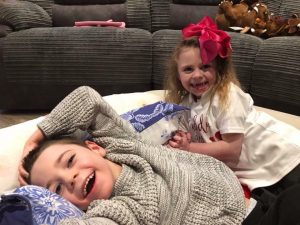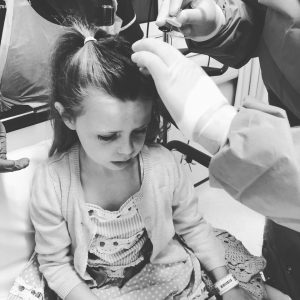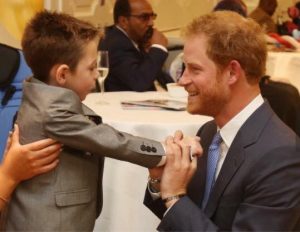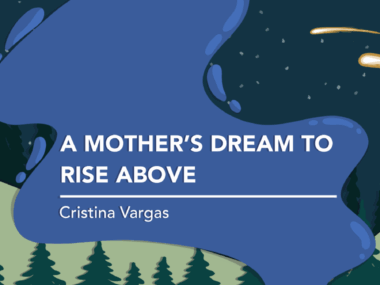UK Batten Families Welcome Brineura Access for CLN2 Patients Through NHS
Written by |

Ollie and Amelia Carroll, ages 8 and 6, both have Batten disease. (Photo courtesy of Lucy Carroll)
When Ollie Carroll was 5 years old, the British boy made history by becoming one of the world’s youngest Batten disease patients to begin receiving Brineura (cerliponase alfa), a very expensive yet effective therapy for kids with CLN2 — one of 14 subtypes of the illness.
While the infusion can’t bring back Ollie’s ability to walk or talk, Brineura — developed by San Francisco-based BioMarin — has improved his life tremendously, says his mother, Lucy.
And its effect on Ollie’s little sister, 6-year-old Amelia, has been even more dramatic.
“Because she managed to get the treatment at age 3, she can still walk, she can still talk and she’s learning new words every day,” Carroll told Batten Disease News by phone from Cheshire, England. “Amelia goes to a regular school and she’s fully toilet-trained. She had one seizure prior to treatment, and in November she’ll be seizure-free for three years.”
The Carroll siblings are among 27 children throughout England who will benefit from a recommendation made by the National Institute for Care and Excellence (NICE) on Sept. 11 to include Brineura in the country’s National Health Service (NHS), funding the therapy for public use in the context of a managed access agreement.
“This treatment shows great promise in slowing the progression of this devastating condition to allow children to enjoy normal childhood activities for longer, which is so important,” said Meindert Boysen, director of Centre for Health Technology Evaluation at the independent, non-government agency.
The decision comes after a year and a half of wrangling between NICE and BioMarin, with desperate patients and their families caught in the middle. This is mainly due to the price of Brineura, which retails in the U.K. for £500,000 (about $625,000) for a year’s supply.
Kathy McSweeney, a family support worker at the Batten Disease Family Association (BDFA), said the London-based charity represents 94 families — some with up to three kids affected by the disease.
“Brineura is the first treatment that’s proven to be effective for any of the 14 types of Batten. If it’s given early enough, it can prevent symptoms from occurring, and keep the disease at bay,” McSweeney said, adding that “it only treats CLN2, which is difficult, because we’d obviously like all children to have access to this treatment.”
Seizure-free and improving
NICE consideration of Brineura began in January 2018 and was supposed to take six to nine months, McSweeney said.
Apart from the NICE recommendation — which applies only to England — Wales already has an agreement, and Scotland is working on one, she said. Northern Ireland generally follows England’s lead when it comes to drug approvals.
Brineura was approved for use by CLN2 patients across the European Union in June 2017, but was not necessarily included in national health systems that cover much or all of its costs; in the U.S., it was approved by the U.S. Food and Drug Administration in April 2017. Infants with CLN2 start showing symptoms of the disease between ages 2 and 4, generally require the use of a wheelchair by late childhood, and usually don’t survive past their teens.
“These decisions always have to be carefully considered. Price was a sticking point, and, as NHS is a public service, the parents were relentless in fighting to get this approved,” McSweeney said. “Anyone who’s a parent doesn’t want to watch their child die, and that’s effectively what they were doing.”
Both Ollie and Amelia Carroll were both diagnosed in 2015; their two older siblings are healthy. Ollie started taking Brineura in November 2016, and Amelia in February 2017. The family doesn’t pay for the expensive infusion because BioMarin agreed to treat both children free of charge on a “compassionate use” basis.
Carroll worked at a nursery school, and her husband, Mike, had his own construction company, but both had to give up their jobs to care for their sick children full-time.
“Ollie started the drug at age 5,” she said. “He couldn’t walk or talk anymore, and he was having hundreds of seizures a day before treatment. But now he’s been seizure-free for two years.”
Surprise visit from Prince Harry
Even though Ollie may never be able to walk or talk, she said, “his quality of life has improved massively and he’s really happy. We even managed to go on a family holiday to Disney World in Florida. That wouldn’t have been possible before.”
In October 2016, Ollie even got a surprise hug from Prince Harry — an emotional moment captured in a Royal Family Channel video that’s been viewed on YouTube more than 2.6 million times.
Carroll said the treatment will now be available under a managed access agreement for the next four and a half years. That means children on Brineura will be assessed every six to 12 months, and at the end of the managed-access period, NICE will revisit its decision — based on the evidence that’s been gathered — on whether the therapy should remain available through NHS.
The Brineura infusions last four hours each, and are given every two weeks via an access port that delivers the therapy directly into the brain.
London’s Great Ormond Street Hospital is the only facility in England currently authorized to administer Brineura. That means the Carrolls must take a two-hour train ride each way every two weeks and stay overnight in a hotel.
The BDFA is campaigning to make the treatment available at Manchester Children’s Hospital, a half-hour drive from where the Carrolls live.
With the NICE ruling out of the way, all parties involved now enter the implementation stage, McSweeney said, and eligibility criteria must be established for children who need the drug.
“We expect this medicine to be available as soon as possible, because these children are losing skills every day, and they become ineligible while they’re waiting,” she said. “These families don’t want to waste any more time.”
Spinraza victory was morale booster
The BDFA, formed in 1998, operates on an annual budget of £442,000 (about $555,000) — less than a year’s supply of Brineura for one child with Batten disease.
Samantha Barber, the group’s CEO, called the NICE recommendation “a landmark decision” and thanked members of the British Parliament for their influence.
“We were very fortunate that we had a lot of support across all the major political parties,” she told us by phone. “Although NICE is not a government body, I think the MPs were reflecting the kind of feedback we were getting — not just from our families, but public scrutiny in general. That groundswell of support really helped us.”
The BDFA’s fight to get Brineura covered by NHS, Barber said, follows a similar campaign by people with spinal muscular atrophy (SMA) and parents of SMA children to win reimbursement for the Biogen infusion treatment Spinraza (nusinersen), which carries a U.S. retail price of $750,000 for the first year and $375,000 every year thereafter.
NICE agreed to recommend funding Spinraza in May 2019 after a review marked by angry protests by SMA patient advocacy groups in front of the agency’s Manchester headquarters.
“This being a rare disease charity, I have connections with many of our sister organizations,” Barber said. “Their win gave us hope, and that’s one of the most important things when you’re doing something like this. That feeds your energy.”
Looking beyond Brineura’s approval, Barber said she’s “very worried” about the distinct possibility of a no-deal Brexit that leaves the U.K. outside the EU come Oct. 31.
“Obviously, we’ve been really embedded in some very large projects, and because of the tiny size of the Batten disease population, when you get these ultra-rare diseases, you need a global population — not just Europe — in order to make your research robust,” she said.
“My fear is that we would be excluded from particular research projects and being able to share information between us and the EU. That’s one of the things that keeps me up at night.”








